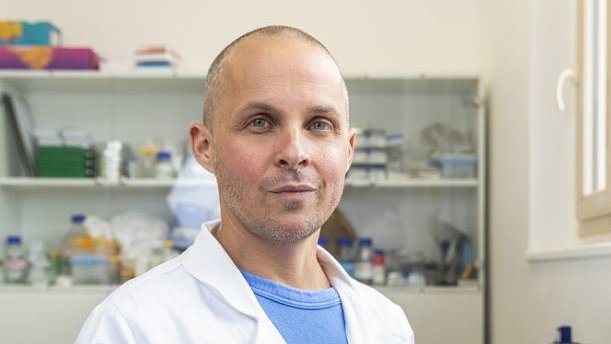Share this @internewscast.com
When Raphael Rodriguez realized medical school was not for him and left after the first year, he was forced to reconsider his entire life plan.
‘I knew I was still destined to help people somehow,’ he told DailyMail.com.
He swapped scrubs for a lab coat, learning from top organic chemists at Oxford and Cambridge.
It was in the lab — not the lecture hall — that he had his revelation.
‘Very quickly, I realized that when you know what compound to make, and if you’re capable of making it, then you might be able to pull out a drug and cure many more people than you if you want to be a clinician.’
Now, years later, that vision may be coming true — Rodriguez and his team have engineered a powerful new compound that could stop cancer from doing what it does best: spreading and killing.
Called Fentomycin-1, the experimental molecule targets one of cancer’s most dangerous weapons — its ability to metastasize to other parts of the body — which is responsible for at least 70 percent of cancer deaths. The rest are due to complications from localized tumors or blood cancers.
‘When you look at the literature, you quickly realize that 70 percent of cancer patients do not succumb to the primary tumor, but the metastatic spread,’ Rodriguez said.

After years of research in chemical biology that can be leveraged to fight cancer , Dr Raphael Rodriguez and his team have developed a molecule that could save millions from deaths caused by the cancer spreading to other parts of the body
‘I realized the gap. The treatments we have are not sufficient — they are not designed to target metastasis, and they are not designed to target the capacity of a cell to migrate.’
Cancer cells hoard iron in special compartments called lysosomes, which makes them more aggressive — but also gives them a hidden weakness.
That same iron can trigger a process called ferroptosis, which destroys the cancer cell from the inside out.
Rodriguez said: ‘We conceptualize the fact that cancer cells can exploit iron chemistry to adapt, to change identity, to be plastic, to become invasive.’
But at the same time, he said, iron is chemically active (redox-active), meaning it easily reacts with molecules in cells.
‘The paper that we just published exploits that finding, basically: could we develop a compound that would accumulate inside of the cell where iron is loaded, and can we manipulate the chemistry of iron?’
Rodriguez, a French biochemist, helped develop Fentomycin-1, a molecule that supercharges ferroptosis.
In early lab tests, metastatic cancer cells were wiped out in less than 12 hours.

Cancer cells aggressively stockpile iron in lysosomes to fuel their spread—but this creates a fatal flaw. The same iron can trigger ferroptosis, a self-destruct mechanism that corrodes tumors from within
‘And this was spectacular,’ Rodriguez said.
‘At this point in time, cancer patients are dying — specifically in this population [with these cancers].
‘And it was very gratifying for us to see that we are capable of designing a compound that does what we wanted to do.’
The team tested Fento-1 in aggressive forms of pancreatic cancer, breast cancer, and sarcomas, a group of rare malignant tumors that form in bones or soft tissues — all known for drug resistance, high iron levels, and grim survival rates.
In mice injected with breast cancer cells, the drug slowed tumor growth and activated the immune system, potentially offering a one-two punch with existing treatments.
It also worked well in combination with chemotherapy, especially in pancreatic cancers.
Rodriguez’s lab even tested tumor samples taken directly from patients after surgery.
The compound reduced the number of cells with CD44, a protein that helps cancer resist drugs and spread to new organs.

Rodriguez’s team tested Fento-1 in aggressive forms of pancreatic cancer, breast cancer, and sarcomas, a group of rare malignant tumors that form in bones or soft tissues — all known for drug resistance, high iron levels, and grim survival rates
Because cancer cells have higher iron levels than surrounding healthy tissue, Fento-1 can target tumors with precision, leaving normal cells relatively unharmed.
Clinical trials will be needed to determine if these molecules could be leveraged as new cancer treatments.
Before then, Rodriguez said, his team will have to raise funds for the next stage of research, which will establish basic knowledge about how the compound might interact with living human cells in the body.
But Rodriguez is clear — getting there will take funding, testing, and more time.
‘There are a few other [data sets] that are not published, and what we now need to do is [figure out] can we scale up the compound, is it stable, is it bioavailable, can we take it by IV, how does it get decomposed inside the body, what is the clearance of it?’
‘At this point in time,’ he added, ‘we are happy with the compound we made.’
His team’s findings were published in the journal Nature.

Metastatic cancer cells are adept at resisting chemotherapy by developing ways to prevent the medicine from entering the cell, and radiation treatments, by learning how to repair any damage done to their DNA to help them survive
When cancer cells spread beyond their original site in the body, or metastasize, it becomes markedly more difficult to treat and reach remission.
Metastatic cancer cells can adapt to new, hostile environments, such as unfamiliar organs and tissues, adjusting their metabolism and outsmarting the immune system.
They are also adept at resisting chemotherapy by developing ways to prevent the medicine from entering the cell, and radiation treatments, by learning how to repair any damage done to their DNA to help them survive.
Estimating the exact number of Americans living with metastatic cancer at any single time is challenging due to limited real-time tracking.
The National Cancer Institute estimated in 2018 that there were more than 623,000 people in the US living with the six most common metastatic cancers – bladder, breast, colorectal, lung, melanoma, prostate.
That rate was expected to increase to nearly 700,000 in 2025.












